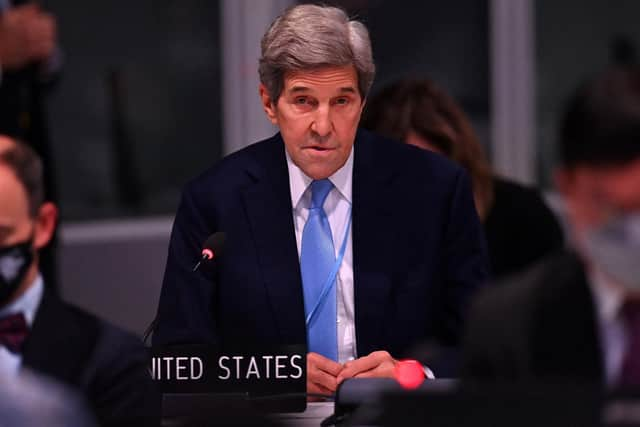Ukraine war: Vladimir Putin's invasion could speed move to green energy, US climate envoy John Kerry says
In fact, the war, which is having a major impact on international oil and gas supplies, may push Europe to accelerate moves to increase renewable energy and end reliance on fossil fuels, he says.
The pact, hammered out at the COP26 climate summit in Glasgow last November, saw nearly 200 countries agree to “rapid, deep and sustained reductions in global greenhouse gas emissions” and a phasedown of coal power in a bid to restrict global temperature rise to “well below” 2C, with a goal of 1.5C.
Advertisement
Hide AdAdvertisement
Hide AdThis means cutting emissions by 45 per cent by 2030, compared to 2010 levels, and reaching net zero by 2050.
In an interview for the BBC’s No Hot Air podcast, politician and diplomat Mr Kerry said the Russian president “hasn't wrecked” the climate agreement, “but he's presented a challenge to it".
He said: “What Vladimir Putin has done by using gas energy as a weapon, is to convince Europe that it has to move faster.
“So, in fact, Europe is going to try to move to deploy renewable energy, wind, solar, etc, much faster than they originally had planned.”


A recent report from the United Nations suggests that current policies put the world on course for 3.2C of warming by the end of the century.
Estimates based on national commitments set out at COP26 suggest this could be cut to 1.8C – still far in excess of the 1.5C target.
“We can say with credibility that we have kept 1.5C within reach but its pulse is weak,” UK minister and COP26 president Alok Sharma said as the conference closed.
Mr Kerry echoed the sentiment but remained hopeful that action would be ramped up.
Advertisement
Hide AdAdvertisement
Hide Ad"The bottom line is we're in trouble right now unless we can turn things around faster over the next eight years," he said.
"We have to still fight for the 1.5, as hard as it may be.
“But I remain an optimist, because I think that if we do what we've promised to do, we can have a 45 per cent global cut globally between now and 2030."
Comments
Want to join the conversation? Please or to comment on this article.
